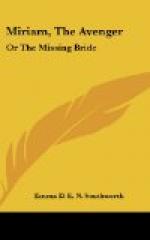but he was always completely baffled in his aspirations
after a nearer communion. She was always attended
from the church and assisted into her saddle by Judge
Provost, Colonel Thornton, or some other “potent,
grave and reverend seignors,” who “hedged
her about with a divinity” that it was impossible,
without rudeness and intrusion, to break through.
The more he was baffled and perplexed, the more eager
became his desire to cultivate her acquaintance.
Had his course been clear to woo her for his wife,
it would have been easy to ask permission of Edith
to visit her at her house; but such was not the case,
and Thurston, tampering with his own integrity of
purpose, rather wished that this much coveted acquaintance
should be incidental, and their interviews seem accidental,
so that he should not commit himself, or in any way
lead her to form expectations which he had no surety
of being able to meet. How long this cool and
cautious foresight might avail him, if once he were
brought in close companionship with Marian, remains
to be seen. It happened one Sunday afternoon
in October that he saw Marian take leave of her venerable
escort, Colonel Thornton, at the churchyard gate,
and gayly and alone turn into the forest road that
led to her own home. He immediately threw himself
into his saddle and followed her, with the assumed
air of an indifferent gentleman pursuing his own path.
He overtook her near one of those gates that frequently
intersect the road. Bowing, he passed her, opened
the gate, and held it open for her passage. Marian
smiled, and nodded with a pleasant:
“Good-afternoon, Mr. Willcoxen,” as she
went through,
Thurston closed the gate and rode on after her.
“This is glorious weather, Miss Mayfield.”
“Glorious, indeed!” replied Marian.
“And the country, too, is perfectly beautiful
at this season. I never could sympathize with
the poets who call autumnal days ’the melancholy
days—the saddest of the year.’”
“Nor I,” said Marian; “for to me,
autumn, with its refulgent skies, and gorgeous woods,
and rich harvest, and its prospect of Christmas cheer
and wintry repose has ever seemed a gay and festive
season. The year’s great work is done,
the harvest is gathered, enjoyment is present, and
repose at hand.”
“In the world of society,” said Thurston,
“it is in the evening, after the labor or the
business of the day is over, that the gayest scenes
of festivity occur, just preceding the repose of sleep.
So I receive your thought of the autumn—the
evening of the year, preceding the rest of winter.
Nature’s year’s work is done; she puts
on her most gorgeous robes, and holds a festival before
she sinks to her winter’s sleep.”
Marian smiled brightly upon him.
“Yes; my meaning, I believe, only more pointedly
expressed.”
That smile—that smile! It lightened
through all his nature with electric, life-giving,
spirit-realizing power, elevating and inspiring his
whole being. His face, too, was radiant with life
as he answered the maiden’s smile.




